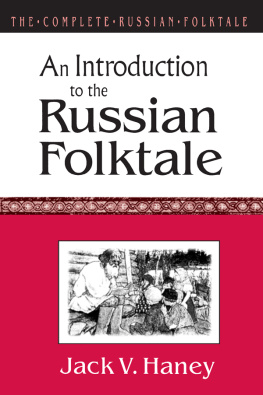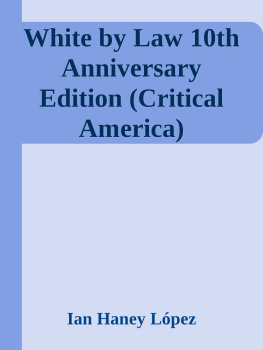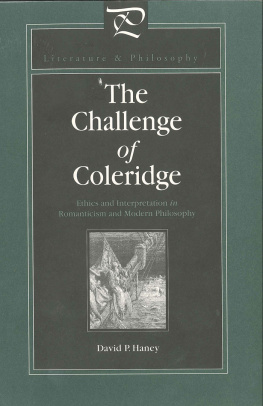THE COMPLETE FOLKTALES OF
A. N. Afanasev
Volume I
THE COMPLETE FOLKTALES OF
A. N. Afanasev
Volume I
Edited by Jack V. Haney
www.upress.state.ms.us
Designed by Peter D. Halverson
The University Press of Mississippi is a member of the Association of American University Presses.
Copyright 2014 by University Press of Mississippi
All rights reserved
Manufactured in the United States of America
First printing 2014
Library of Congress Cataloging-in-Publication Data
Afanasev, A. N. (Aleksandr Nikolaevich), 18261871.
[Narodnye russkie skazki. English]
The complete folktales of A. N. Afanasev / edited by Jack V. Haney.
volumes ; cm
Includes bibliographical references.
ISBN 978-1-62846-093-3 (cloth : alk. paper) ISBN 978-1-62846-094-0
(ebook) 1. TalesRussia. I. Haney, Jack V., 1940 editor. II. Title.
GR202A4313 2014
398.20947dc23 2014014293
British Library Cataloging-in-Publication Data available
For Alethea
and
Phoebe
CONTENTS
Introduction
A. N. Afanasev: His Life and Works
PREFACE
THERE HAS LONG BEEN A NEED FOR A COMPLETE TRANSLATION of the greatest Russian folktale collection, that of A. N. Afanasev (182671). Afanasevs folktales, the result of his own collecting and that of many folklore enthusiasts in Russiaand in a few cases, the reprinting of tales printed in Russia before his timeare easily the greatest single repository of tales in Russia, if not the world. The latest academic edition offers more than 575 tales, and this number includes neither Afanasevs legends nor his forbidden tales, those excluded during his lifetime (and after) by the strict censorship of tsarist Russia and the Soviet Union. Folklorists who have no Russian have for too long been obliged to exclude the vast Slavic folktale tradition from their purview, although dozens of fine, scholarly editions of Russian, Ukrainian, Byelorussian, and other Slavic peoples tales exist and are readily available. These three volumes of translations, it is to be hoped, will begin to fill the gap.
The last several years have seen the appearance of important works in English dealing with the Russian folktale, directly or indirectly: Sibelan Forrester has translated V. Ia. Propps Russkaia Skazka (The Russian Folktale); Robert Chandler offers Russian Magic Tales from Pushkin to Platonov; Forrester also has a selection of tales, Baba Yaga: The Wild Witch of the East in Russian Fairy Tales, and there is my Long, Long Tales from the Russian North. Not so long ago, Andreas John published Baba Yaga: The Ambiguous Mother and Witch of the Russian Folktale, and my The Complete Russian Folktale appeared in seven volumes. There is clearly interest in the Russian folktale.
The time has come for Afanasevs work to take its place alongside the tales of the Brothers Grimm and other Western European collections to offer balance to our view of the European folktale. In preparing these volumes I have been encouraged by folklorists in Russia, Canada, Armenia, England, and the United States. I am indebted to them and to many of my former students, whose interest in the Russian folktale was stymied by the lack of an adequate translation that included at least a minimal scholarly apparatus of Afanasevs great achievement.
Finally, a brief word about skazka, the Russian word used for the tales in the Afanasev collection and elsewhere. It is derived from the verb skazat, meaning to say or to tell. The Russian language has many related forms of that verb, and the noun skazka has given birth to a number of other words, all of which point to the same notion: an oral narrative. Russians use the word skazka to refer to tales about animals (skazki o zhivotnykh), to tales of enchantment (wondertales or magic tales known as volshebnye skazki), and to tales of everyday life (bytovye skazki). The term fairy tale is here used only in reference to literary adaptations or imitations of the folk wondertales, although I am aware of its widespread use in the French and English scholarly traditions. Where it is necessary to distinguish the various large classes into which folktales are usually divided, I will refer to wondertales, a translation of the Russian volshebnaia skazka.
ACKNOWLEDGMENTS
I FIRST BECAME ACQUAINTED WITH A. N. AFANASEVS INCOMPARAble collection of folktales more than fifty years ago when I was a student at The Queens College, Oxford. Over the years, I worked extensively with the tales in classrooms where I was lecturing university students on Russian folklore. The need for a complete translation of the tales was obvious, but other demands prevented my undertaking the project until now. The present translation has benefitted from the advice and support of many people, among whom I mention Tatiana Bogrdanova, Robert Chandler, and my friends and familyespecially my patient wife, Barbara. I am most grateful to the editor in chief of the University Press of Mississippi, Craig W. Gill, and his staff for their professional support in the completion of this project, as well as for the assistance of copyeditor Lisa Paddock. I dedicate this translation of Afanasevs folktales to my granddaughters, Alethea and Phoebe Bradford, and more widely to grandchildren everywhere.
INTRODUCTION
A. N. Afanasev: His Life and Works
ALEKSANDR NIKOLAEVICH AFANASEV WAS BORN IN THE GUBERniia (province) of Voronezh, located southeast of Moscow, on 12 July 1826. His father was a minor court official in the small town of Boguchar. His mother died when Aleksandr was an infant, and his father, a domineering figure, oversaw his sons upbringing. The family had limited resources, and Afanasev later stated that though his father was brought up on coppers (na mednye dengi), Nikolai Ivanovich Afanasev was a respected man in the Boguchar district. He was educated and frequently consulted on legal matters, and he subscribed to several of the leading monthly journals of his time. Afanasevs grandfather was also a motivating force in the young boys life. Grandfather Ivan Afanasev was a member of the local bible society and had a sizeable library that the young Afanasev frequently perused.
Little is known about Afanasevs childhood. In 1829 or 1830 the family moved from Boguchar to Bobrov, a small town southeast of Voronezh in the same Voronezh province. It was here that Afanasev first heard the folktales that were to become such an important part of his life. It was here that he learned to read, and here began his lifelong passion for learning. Long before Aleksandr Nikolaevich entered the university, he was reading the thick journals of his day, the Biblioteka dlia chteniia, Otechestvennye zapiski, and the Moskvitianin, among others. Aleksandr had three brothers and three sisters, all of whom received a modicum of schooling, and together with his older brother he was sent to two priests for his education. These two, both named Ivan, were recalled by Afanasev in his memoirs: They were certainly not bad men but raised in the seminary, they were acquainted only with that strict sense of upbringing and constantly repeated to us that the root of learning was bitter.1. But Afanasev persevered, attending classes with the parish priests both in the morning and in the afternoon up to the age of eleven. Lessons included readings in Russian and Latin. Afanasev was apparently a normal boy. He relates that after a fight with another student he was rewarded with the rod, normal punishment for such behavior.








